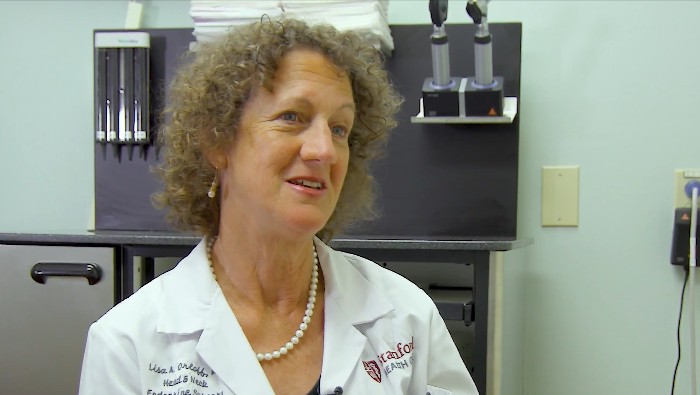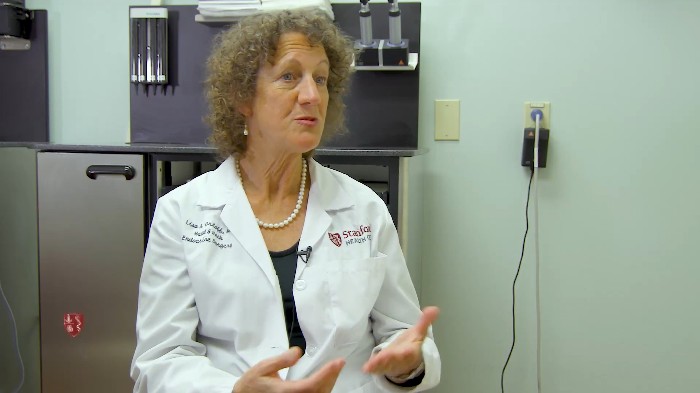Overview
What is thyroid cancer?
The thyroid gland sits toward the front of your neck, just below your voice box (larynx). It has two lobes that sit on either side of the trachea (windpipe) and are connected by a thin bridge. Two primary classes of cells make up your thyroid gland:
- Follicular cells: These cells convert iodine that circulates in your blood into thyroid hormone.
- C cells: These cells produce calcitonin, a hormone that regulates how your body uses calcium.
Thyroid cancer typically develops from one of these types of cells. The differences in these cell types affect treatment and outcomes.
How does thyroid cancer develop?
In general, cancer develops after the genetic material in cells mutates and the cells begin growing out of control. When enough of these abnormal cells accumulate, they can form a tumor that your doctor may see on an ultrasound or feel as a lump during a clinical exam.
Connect to Care
Let us help find personalized care options for you and your family.
Symptoms of Thyroid Cancer
Doctors often detect signs and symptoms of thyroid cancer during routine medical exams. Symptoms include:
- Hoarseness or persistent cough
- Lump or unusual swelling in the neck
- Trouble swallowing or breathing
Risk Factors for Thyroid Cancer
You can control some risk factors for thyroid cancer, but not others. Having one or more of these factors does not necessarily mean that you will develop thyroid cancer. In fact, most people who develop thyroid cancer have no known risk factors.
Thyroid cancer risk factors that you cannot change include:
- Age: Thyroid cancer risk increases with age, especially in women in their 40s and 50s, and men in their 60s and 70s.
- Family history of thyroid cancer: Having a close relative who had thyroid cancer increases your risk.
- Gender: Women are much more likely to develop thyroid cancer than men.
- Hereditary conditions: Medullary thyroid cancers often result from inheriting an abnormal gene.
Risk factors that are within your control include:
- Diet low in iodine: Low iodine intake has been linked to an increased risk of thyroid nodules and potentially thyroid cancer. But, since manufacturers in the United States add iodine to table salt and many packaged foods, iodine deficiency is extremely rare in the US.
- Radiation exposure: People treated with radiation therapy to the head or neck for a previous cancer have a higher risk of developing thyroid cancer. In particular, people who received radiation as children, rather than adults, have the highest risk.
Thyroid Cancer Prevention
Thyroid cancer is often difficult to prevent because most people with thyroid cancer do not have any known risk factors. Starting treatment when the cancer first begins to grow gives you your best chance of a cure.
Types of thyroid cancer
The more common types of thyroid cancer are named for where they start in the cells. The major types are:
Differentiated thyroid cancer
Most thyroid cancer is differentiated, meaning the cancer cells look close to normal thyroid cells. Differentiated thyroid cancer develops in thyroid follicular cells. There are three main types of differentiated thyroid cancer:
- Papillary thyroid cancer is the most common type of thyroid cancer, making up about 85% of all thyroid cancer cases. It is found in the broadest spectrum of age groups, from children to elderly adults.
- Follicular thyroid cancer accounts for about 10% of thyroid cancers. It can spread to nearby lymph nodes, as well as distant areas of the body.
- Hurthle cell thyroid cancer is a subtype of follicular thyroid cancer that makes up about 3% of all thyroid cancers. It is more difficult to diagnose and treat and behaves more aggressively.
Medullary thyroid cancer (MTC)
This form of thyroid cancer is more likely to run in families. MTC is often more aggressive and less common than differentiated thyroid cancers.
Anaplastic (undifferentiated) thyroid cancer
This rare form of thyroid cancer makes up about 1% of all thyroid cancers. Undifferentiated thyroid cancer cells don’t look like normal thyroid cells. Anaplastic thyroid cancer is the most aggressive type of thyroid cancer and one of the most aggressive types of cancer, in general.
Stages of Thyroid Cancer
When your care team determines your diagnosis, they also assess how advanced the cancer is. This is called its stage. Doctors use a system called TNM staging to describe how much thyroid cancer has grown or spread within the body.
In TNM staging, each letter describes an aspect of the cancer:
- Tumor size, which tells your doctor how large the tumor has grown and how likely it is to have spread
- Nodes, indicates whether cancer is present in nearby lymph nodes and, if so, how many
- Metastasis, meaning whether the cancer has spread beyond the lymph nodes
Doctors also determine the stage of thyroid cancer based on the specific type of cancer and your age.
Staging helps you and your doctor make decisions about your treatment plan. This information is also helpful in determining your prognosis (probable outcome based on the experience of others).
At Stanford Health Care, our specialists perform a thorough evaluation to accurately diagnose thyroid cancer. We tailor our diagnostic tests to each individual patient. Your assessment may include:
Physical Exam
If your symptoms suggest thyroid cancer, your doctor will ask about your health history and your family’s medical history. They will also do a physical exam to check the firmness and size of your thyroid and whether you have enlarged lymph nodes.
Based on the outcome of your physical exam, your doctor may schedule you for different types of thyroid imaging. If you have been screened elsewhere and received abnormal results, we may perform additional follow-up tests. These imaging tests may include:
If imaging tests suggest you may have thyroid cancer, your doctor may order a thyroid biopsy. We use ultrasound imaging to guide the needle for the biopsy. Stanford Health Care has one of the top experts in the U.S. on ultrasound-guided biopsy for thyroid cancer. Using ultrasound guidance, your doctor either inserts a very thin needle and syringe (fine-needle aspiration biopsy) or a wider needle (core biopsy) into your thyroid to remove a tiny sample of cells for testing.
Rarely, when the type of tumor cannot be determined with a needle biopsy, a surgical (or excisional) biopsy may be required to remove the thyroid lobe containing the tumor to test it for cancer.
Genetic tests for thyroid conditions identify changes in genes, chromosomes, or proteins. For some types of thyroid cancer, particularly medullary thyroid cancer, genetic testing can show whether you have inherited mutations in genes related to the disease.
During diagnosis and treatment, we take small samples of your blood to test in the lab. These thyroid lab tests show how well your thyroid gland is working. This helps your doctor with both diagnosis and planning your treatment.
Thyroid Cancer
Learn more about how specialists in endocrinology, endocrine surgery, nuclear medicine, and other fields come together for your thyroid cancer care.
thyroid cancer
Thyroid cancer symptoms
papillary thyroid cancer
thyroid cancer treatment
medullary thyroid cancer
types of thyroid cancer
thyroid tumor
cause of thyroid cancer


